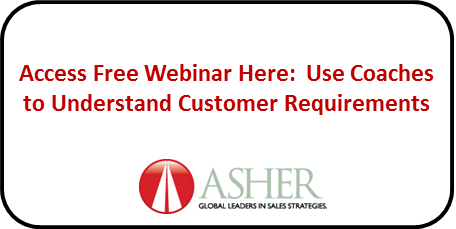Effective Questioning to Discover the Highest Needs
Executive sales training is needed for anyone selling to the C-suite, especially when the product or service is a highly complex, large-ticket solution with a much longer runway in getting each sale closed and fulfilled. In this high-stakes sales niche, consultative selling works very well due to its focus on asking questions and allowing the prospect to talk, rather than aggressive pitching.
In order to discover the highest needs of an executive buyer, and therefore propose the product or service which best solves the “pain” for him, the types of questions and their wordings have to be carefully thought out.
Here are some questioning tips for use in your next executive sales training sessions.
Prepare a list of tentative questions beforehand
Selling to the corporate suite is akin to playing in the major leagues of professional sports. It requires salespeople bring their “A-game” to every appointment, as only the best prepared and rehearsed professionals can hope to have any long-term success in this arena.

As such, a list of tentative open-ended questions should be drafted up and practiced/role played as part of executive sales training and before every appointment. These should encourage the prospect to talk and reveal the biggest challenge or opportunity facing them, such as:
- “What do you feel is hindering your growth?”
- “Where are your biggest expansion opportunities?”
- “What do you feel your competitors do better?
Care should be taken not to overreach and offend the prospect by being too “nosy” or pushy in demanding answers. Develop rapport and trust.
Use implication questions
After discovering the major area of concern, implication questions are used do make the problem seem more acute and emotionally real to the buyer. Example implication questions include:
- “How does this affect you?”
- “What is the biggest problem this causes in your operation?”
- “What are the consequences to your company and to you personally if this isn’t handled?”
- “What would be the financial effect of curing this issue?”
In some cases, the salesperson will discover that the buyer has been living with a problem for so long, that he has taken it for granted and never considered the real consequences prior to the sales call. Once the “pain” is made very real to the buyer, it is time to solve their issue with the close.
Build minor agreements to lead to the close
Closed-end questions are usually answered with a “yes,” “no” or with a short, definitive answer. They are not very effective when trying to get information as they usually lead to a stop or pause in the conversation, and the salesperson must continue to ask questions to keep the buyer talking.
There is, however, one executive sales training strategy that leverages closed-end questions to build minor agreements in order to lead to a close. As an example:
Saleperson: ”We’ve already agreed this fits in your budget, correct?”
Buyer: “Yes.”
Salesperson: “And we have adequately gone over our lifetime warranty, free maintenance plan and on-site tech support, right?”
Buyer: “Mm-hm.”
Saleperson: ”And our delivery time frame matches your expectations, yes?”
Buyer: “Yes, it looks good.”
Salesperson: (THE CLOSE) “Well, from where I sit, with your endorsement on the paperwork, we can begin service to reduce your IT bottleneck [or whatever else the problem/opportunity was] right away. (Slides paperwork over to buyer)
The point is to get the buyer agreeing, even nodding his head along with the salesperson, to build the buying momentum and make it easier for them to say “yes” when the closing question is asked.
As can be seen, effective questioning is a vital skill that should be stressed in all executive sales training programs.




